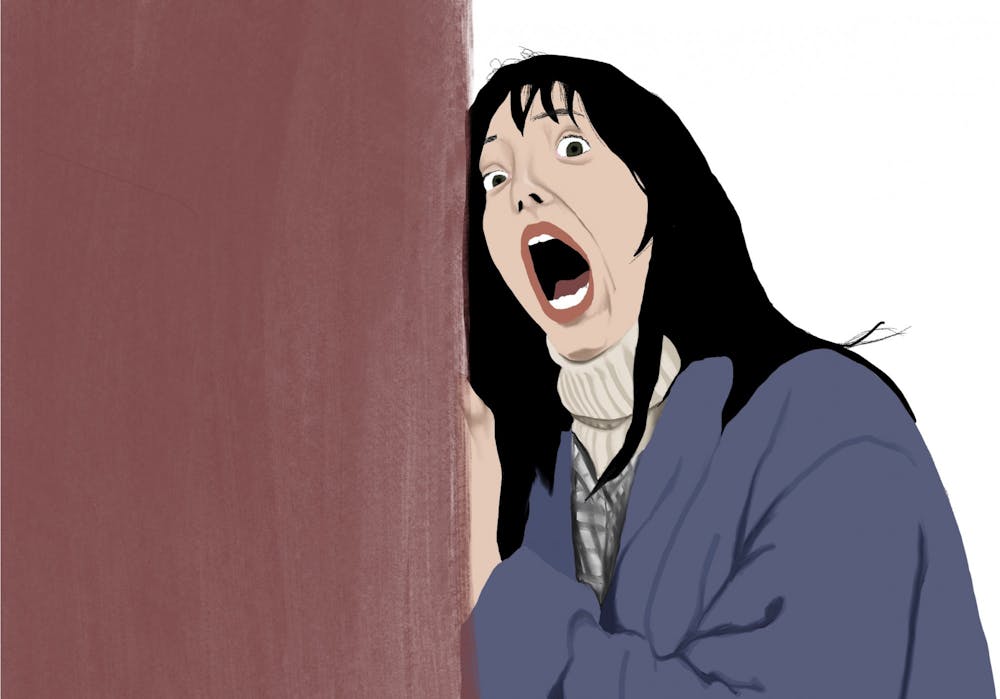Ask any filmbro what his favorite horror movie is, and he is bound to say The Shining. After countless months of being labelled as “uncultured” for refusing to indulge in this cult classic, I finally cracked under the pressure and decided to see if The Shining really warranted all of this praise. After three long hours of my life that I unfortunately will never get back, I was unimpressed.
The most damning point: the movie is racist. At the beginning of the movie, we meet Dick Hallorann, the chief chef at the Overlook Hotel with psychic abilities. He also happens to be the only Black character in the movie. Upon getting a mental cry for help from Danny Torrance, another character with psychic abilities, he hops on a plane from Florida to come to the rescue. Within seconds of arriving, one dares to hope that Danny and his mom, Wendy, might be safe—that they might escape with Hallorann and live happily after. But as he calls out to Danny and Wendy, Jack leaps out and immediately buries an axe into poor Hallorann’s heart, fulfilling a classic trope in horror movies in which Black characters are murdered to uplift the movie’s white victims and to push the plot forward with a sense of dread and excitement.
One might be compelled to argue that in order for the movie to succeed, someone had to die, and as a result, Hallorann’s death is a mere coincidence—or that the Overlook Hotel feared Hallorann and his connection to Danny. But Stanley Kubrick, the director, never explores any of those interpretations in the film, simply killing him off. It's also worth noting that in Stephen King’s novel, Hallorann actually survives and is able to escape with Wendy and Danny. Not only that, but he lives a long, fruitful life afterwards, where he helps raise and take care of Danny.
Wrongful death aside, The Shining’s racism manifests often throughout the movie, especially when the ghosts of the Overlook Hotel and Jack discuss Hallorann in a very derogatory manner, dropping the N–word repeatedly. Jack’s sense of white entitlement continues to manifest in dangerous ways, especially as the hotel increasingly takes a hold over his soul, perhaps acting as a metaphor for Kubrick’s own sense of entitlement and sadistic tendencies.
Speaking of sadistic tendencies, Kubrick’s maltreatment of his actors during the movie shoot definitely qualifies as sadistic, and perhaps manifested in Shelley Duvall's performance. Her performance in the film was criticized by fans and critics alike. Even King told IndieWire that the movie’s Wendy was “one of the most misogynistic characters ever put on film. She’s basically just there to scream and be stupid.”
However, I would argue that Duvall encapsulates the sheer terror and fear in standing up to an abusive partner perfectly. She exudes nervous energy, desperately trying to maintain her composure until she, quite literally, breaks down—perhaps reflective of what she had to endure during the movie shoot. Kubrick kept her isolated and forced her to perform the iconic 'baseball bat' scene an exhausting 127 times. Perhaps the misogynistic interpretation of Wendy’s character wasn’t a fault of Duvall, but of Kubrick and his decision to cut many of Wendy’s lines. Meanwhile, no one talks about the fact that Jack Nicholson, who played Jack in the movie, acts very unhinged too early on.
Lastly, if I’m being honest, the movie was just dull. Yes, The Shining was aesthetically beautiful and hid layers of meaning within its scenes and cinematography. And yes, I understand it’s meant to be slow, yet unsettling. But truth be told, I found myself bored and frustrated with the movie. Perhaps I am not meant to be a filmbro. At least that means I can get back to watching The Haunting of Bly Manor.

